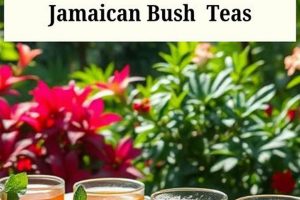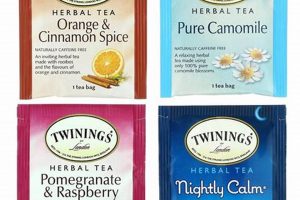
Infusions derived from various plants have been used traditionally to alleviate symptoms associated with hypersensitivity reactions. These preparations, often consumed as beverages, incorporate botanicals believed to possess properties that can modulate the... Read more »

Certain plant-derived infusions are consumed to potentially alleviate the discomfort associated with the menstrual cycle. These beverages are prepared by steeping various herbs, flowers, or roots in hot water, extracting their active... Read more »

Beverages derived from steeping herbs, spices, or other plant materials in hot water offer potential support for endocrine health. These infusions are not true teas (derived from Camellia sinensis), but rather herbal... Read more »

The term identifies herbal infusions that achieve significant commercial success based on sales volume. These teas, crafted from various herbs, spices, and botanicals, are popular beverage choices. Chamomile, peppermint, and ginger infusions... Read more »

Selection of safe and beneficial botanical infusions consumed during gestation can provide comfort and address common pregnancy discomforts. These beverages, derived from various plants, offer a natural alternative for managing mild symptoms... Read more »

The consumption of infusions derived from herbs, rather than Camellia sinensis (true tea), has gained attention within the context of diabetes management. These beverages, prepared by steeping various plant materials in hot... Read more »

Infusions derived from botanical sources beyond the Camellia sinensis plant, combined with dried or fresh fruits, offer a diverse range of flavors and potential health benefits. These beverages are prepared by steeping... Read more »

Beverages crafted from indigenous Jamaican plants, often prepared as infusions or decoctions, represent a significant aspect of the island’s traditional medicine and culinary practices. These preparations utilize various parts of plants, including... Read more »

Beverages crafted from infusions of herbs, spices, and other plant materials, excluding Camellia sinensis (tea), provide a caffeine-free alternative to traditional teas and coffee. These infusions offer a diverse range of flavors... Read more »

Certain infusions, crafted from a variety of plants, are intended to support the body’s ability to process food and absorb nutrients. These botanical beverages often incorporate ingredients known for their properties that... Read more »


